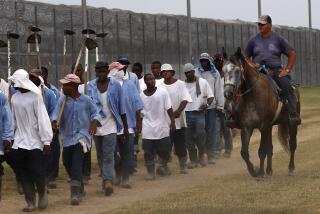Hussein Says He Won’t Eat; Judge Shrugs
- Share via
BAGHDAD — Saddam Hussein and his co-defendants declared in court Tuesday that they had embarked on a jailhouse hunger strike to protest their trial on charges of violating the human rights of Shiite Muslim villagers.
“For the past three days we’ve been on a hunger strike against you and your masters,” Hussein told the judge as he walked into the courtroom. The former Iraqi leader was dressed in a crisp black suit and was more subdued than he has been on other days during the tumultuous trial.
Court officials derided the hunger strike as hoax meant to grab media attention.
“According to my information they had breakfast, while we did not,” lead prosecutor Jaafar Mousawi told The Times. “They eat all the good food.”
The prosecution struggled as it sought to tie Hussein and his entourage to violence inflicted on the villagers of Dujayl after a 1982 attempt to assassinate Hussein in the town. Three witnesses who were compelled to testify repeatedly contradicted written statements collected earlier by lead investigative Judge Raid Juhi, the young lawyer who has become the public spokesman for the Iraqi High Tribunal.
After a session that lasted barely three hours, the judge adjourned the trial until Feb. 28 without giving any reason for the two-week recess. Western officials close to the tribunal have voiced frustration over its slow pace and a feeling that the judges don’t appreciate the financial and human resources expended on proceedings that simply drag on.
“People who think this is just an orchestrated thing, a puppet court of the United States, they’re wildly off,” a U.S. official in Baghdad said in a recent interview. “Do we provide some legal advice? We try to. They don’t always follow our advice.”
Three defendants, Hussein, his half brother Barzan Ibrahim Hasan and former judicial chief Awad Hamed Bandar, said they were on a hunger strike.
After the court adjourned, Juhi declined to confirm or deny whether any defendants were refusing to eat, but pointed out that Hasan had brought bottled water with him into the courtroom.
Mousawi chided the defendants, saying, “Do you think that Barzan would miss a meal?”
Defendants have been using the trial as a stage for political antics, and Tuesday was no exception. Toward the end of the session, in a segment edited out of the version broadcast to viewers with a 20-minute delay, Hussein urged Iraqis to fight the “occupier.”
“I urge Iraqis that everyone should fight and defend his country,” he said.
The proceedings have been conducted with court-appointed defense attorneys since the defendants’ lawyers walked out of the courtroom several weeks ago. Defendants, one in pajamas, were ordered to appear in the courtroom Monday.
The prosecution team alleges that Hussein and his underlings directed a years-long campaign of torture, imprisonment and execution against the men, women and children of Dujayl. But the five former regime loyalists compelled to take the witness stand over the last two days have not corroborated prosecution claims or verified documents they had signed.
Prosecutors attempted to use the first witness Tuesday, a former intelligence officer who testified anonymously, to place former intelligence chief Hasan at the Baghdad intelligence directorate headquarters the night of the Dujayl incident. But he repeatedly said he wasn’t at the scene and had only heard that Hasan was there directing operations against people in the Shiite village 40 miles to the north.
“Everyone in the department knows that the head of the intelligence directorate is responsible for such actions and leading everything,” he said. “Everyone on the street knows that.”
Afterward, Hasan gave his own version of events after the Dujayl incident, saying he obtained the release of 80 people who had been wrongly detained by authorities. He said he didn’t want a repeat of what happened when the late Syrian leader Hafez Assad was the victim of an assassination attempt.
“There was only one thing on my mind,” said Hasan, who wore the same rumpled undershirt he wore in court Monday. “When Assad had an attempt against his life, they took helicopters, the army, and took revenge. I said to myself, I should not act the same. I should not be violent.”
One witness, Fadhel Azzawi, a former Iraqi ambassador to Moscow and intelligence official, said he didn’t know what was in a statement Juhi presented to him to sign. “I signed because I didn’t have my eyeglasses,” he said. “I didn’t see the words. I told [Juhi] frankly I didn’t see what I was signing.”
Possibly the most damning testimony against Hussein came from the former president himself, who in a lengthy soliloquy cast himself as an obsessive dictator who oversaw all aspects of the regime that launched two wars as well as several bloody campaigns against rebellious Shiites and Kurds.
“The [presidential] secretary isn’t informed of security and intelligence matters,” he said. “When I have mail from these groups it comes sealed.... I open it with my own hands, and when I send it, I sign it on multiple sides of the envelope, even the sealed sides.”
Times staff writers Richard Boudreaux and Zainab Hussein contributed to this report.
More to Read
Sign up for Essential California
The most important California stories and recommendations in your inbox every morning.
You may occasionally receive promotional content from the Los Angeles Times.










